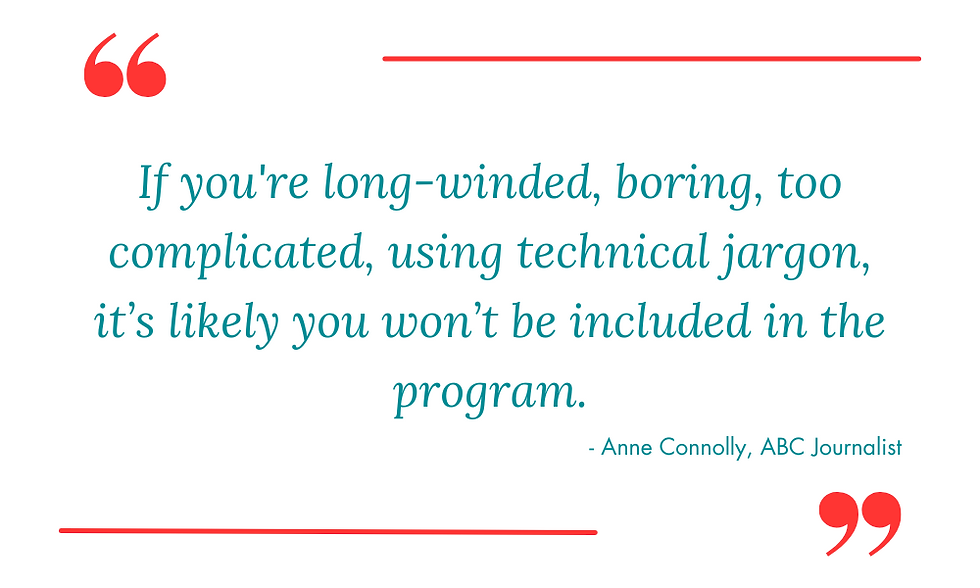Speak to express, not to impress
- Theresa Miller
- Sep 12, 2025
- 4 min read
Updated: Sep 15, 2025
Every industry has shorthand or in-house lingo, which is useful when speaking to your peers, but it's often unintelligible to someone outside your field.
Even well-meaning social workers sometimes lapse into bureaucratic terms such as ‘stakeholders’, ‘self-advocacy’, ‘co-locate’, ‘recovery elements’, ‘deliver outcomes’ and ‘building capacity’.
This can be confusing not only for your clients but the general public as well.
The problem with jargon is that it creates a barrier between you and the listener. They'll either switch off or misinterpret your meaning.
The rule of thumb is to use language understandable to a 14-year-old.
As a professional you may resist the idea of 'dumbing down' your language in a media interview or presentation, in case it makes you sound less credible to your peers.
But here's the rub: when you are speaking to a journalist, or on a panel, a podcast, or giving a presentation or even pitching an idea, you are not speaking to your peers; you are talking to the public, some of whom will have more qualifications than you, and others who may have limited English or experience in your area.
Whether you're speaking to a journalist, a podcaster, or a panel host, every interviewer wants an interviewee who speaks clearly, succinctly and in plain English.

Walkley Award–winning ABC journalist Anne Connolly has some advice for subject matter experts:
'We don't want the audience to turn off or lose track of the story. If you're long-winded, boring, too complicated or using technical jargon, it’s likely you won’t be included in the program,' Anne says.
Tech industry columnist David Pogue sums up his frustration with terminology after years of interviewing IT experts. ‘I cannot stand jargon,’ Pogue says. ‘It exists merely to puff up the speaker at the expense of the audience. It drives me crazy.’

I once interviewed a police officer who was seeking eyewitnesses to a crime. He said on camera: ‘A young, male Caucasian was seen decamping from the scene in a north-westerly direction after the unlawful use of a vehicle.’
This is how police officers are trained to write their incident reports, but this type of jargon doesn’t cut through when encouraging viewers to call Crime Stoppers.
Stick to plain English.

Use words everyone can understand.
One of the world's most famous orators was Britain’s wartime prime minister Winston Churchill. He said, 'I like short words.' Churchill used plain English to great effect. Britons were weary after World War I and the Depression. Churchill's stirring speeches roused them to their feet to defend their island home from a Nazi invasion.
In a radio broadcast, Churchill said: 'We shall defend our island, whatever the cost may be. We shall fight on the beaches, we shall fight on the landing-grounds, we shall fight in the fields and in the streets, we shall fight in the hills. We shall never surrender!'
Such is the power of short words.
Note: he also used the rule of three and repetition. The fate of the British Isles may have been very different if Churchill had said, 'We will seek to interdict vessels which travel here for invalid purposes', which is what former prime minister Kevin Rudd said in a TV interview about Australia's border control operations.

Yet the war on jargon continues today. We are drowning under a deluge of corporate, political and marketing gobbledygook that casts a veil of miscomprehension and hits our off button.
Today, the weather bureau tells us: ‘The coastal area has been impacted by a weather event.’ What’s wrong with ‘the storm hit the beach’?
Businesses write on their websites: ‘We apply uncommon ingenuity to deliver cross-enterprise results.’ Perhaps they come up with clever ways to solve problems. So, why not say that?

Avoid acronyms, foreign words and corporate speak
Acronyms are also a barrier to understanding. When I interviewed an aeronautical expert, she referred to 'EASA', 'FAA' and 'CASA'. Unless you're an aviation expert, it's doubtful you'll know these terms.
Spell out acronyms for the lay audience.
Avoid a foreign word when there's a perfectly good English one. Although sometimes it can't be helped. Ballet, fashion and cooking are full of French words, classical music scores are written in Italian, and psychoanalysts love German terms such as ‘Gestalt’ and ‘Schadenfreude’. But if you use foreign words unnecessarily, you'll risk alienating your audience.

Corporate speak is a language most professionals are well-versed in. Indeed, it’s so pervasive that many in the corporate, political and legal worlds don’t recognise it as jargon. They simply assume everyone understands phrases such as ‘moving forward’, ‘taking it offline’, ‘onboarding,’ ‘circling back’, ‘customer-centric’, and ‘process-driven’.
Author and former political speechwriter Don Watson calls this 'contemporary gibberish' and says: 'the language of business and work grow ever more depleted, barren and senseless.' He warns that corporate speak ‘obscures the truth and erodes nuance and meaning’.

If you’ve been speaking corporate lingo for a while and have forgotten your mother tongue, check out the resources on the Plain English Foundation’s website. You could also practise your messages with someone outside your industry and ask them to stop you each time you use an unfamiliar phrase.
If you are genuine about engaging your audience to deliver meaningful information, then use fresh, simple, direct, plain English.
Enrol in in the TM media and presentation skills online course - on sale now for $495

Want to refresh your media and presentation skills, or introduce a colleague to these techniques?
TM MEDIA's new online course features all the tools, tips and structures of my face-to-face workshop plus a one-hour zoom call with me to practice your interview skills and receive one-on-one feedback.




Comments